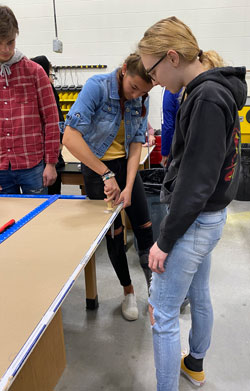Hailie Davidoski has big hopes to be a forensic psychologist. She plans to go to college to study the connection between psychology and the justice system. But in class today, she’s learning how to hang drywall.
“Even though I don’t plan to work in a trade, this is a skill I want to learn because I won’t have many chances to learn on my own,” said the Grandville High senior.

Hailie and many of her classmates are enrolled in Ron Denning’s Home Maintenance and Repair class that has been offered for a few years now. Students focus on foundations and framing, electrical work, plumbing and drywall.
“We’re not making everyone professional drywallers,” Denning said. “We are learning skills that can be taken outside of the classroom.”
After students finish the home improvement class, Denning hopes they have the ability to fix things in their own homes in the future.
“The idea is that maybe a student could take a fixer-upper house and work on it themselves,” he said. “These are skills that are very useful as an adult.”
Denning, who has a bachelor’s degree in industrial education and a masters in career and technical education from Western Michigan University, makes all the structures needed for the class.
Whether or not a student has an interest in pursuing a career in a trade industry, Denning bases the curriculum around his own experiences as a homeowner.

“I try to do all repairs at my home myself,” Denning said. “I can take those experiences and bring them back to the class.”
Learning by Doing
Before the start of each project, students take notes on lessons and watch videos of the work in action for reference.
“Notes only help so much,” Denning said. “They are learning firsthand by doing all of the actual repairs themselves.”
As many of the projects require lifting and are more than a one-person job, collaboration is key to the success of the class.

“We have to work together to get the projects done for sure,” Hailie said. “It’s nice because we are all learning how to do this stuff together.”
Denning incorporates both individual and group participation in every student grade. Each receives a total group grade at the end of a project, as well as an individual, daily work ethic score.
“If a student group got 100 percent on a project but one member only put in 50 percent participation, they would only receive 50 percent of the score,” he said. “This keeps things even: you get the grade you work for.”
The most rewarding part of the job, he said, is hearing success stories of the class’ application outside of the classroom.
Hailie hopes to have that chance soon.
“Now that I have experience I am excited to try things out at home,” she said. “I just have to find the right project.”












